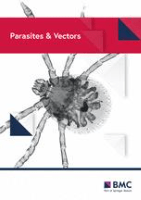
Parasites & Vectors
Scope & Guideline
Exploring the intersection of science and public health.
Introduction
Aims and Scopes
- Parasitology and Vector Biology:
The core focus of the journal is on the biology and ecology of parasites and their vectors, encompassing a wide range of organisms including protozoa, helminths, and arthropods. This includes studies on life cycles, transmission dynamics, and host-parasite interactions. - Epidemiology and Disease Control:
Research articles often explore the epidemiological aspects of parasitic diseases, including risk factors for transmission and disease burden, as well as strategies for control and prevention. - Molecular and Genetic Studies:
The journal publishes studies utilizing molecular tools and genetic analyses to understand parasite and vector biology, including phylogenetics, population genetics, and the mechanisms of resistance to treatments. - Innovative Control Strategies:
Contributions focusing on novel control methods, including biocontrol, genetic manipulation of vectors, and new pharmaceutical compounds, are highlighted, showcasing the journal's commitment to advancing vector control technologies. - Public Health Implications:
The journal emphasizes the public health impact of research findings, aiming to inform policy and practice in the management of vector-borne diseases.
Trending and Emerging
- One Health Approach:
There is an increasing focus on the One Health framework, which integrates human, animal, and environmental health. This trend highlights the interconnectedness of health systems and the need for collaborative interdisciplinary research to tackle vector-borne diseases. - Genomic and Metagenomic Studies:
The application of genomic and metagenomic techniques is on the rise, allowing for more comprehensive studies of parasite and vector diversity, evolution, and interactions with host microbiomes. - Climate Change Impact:
Research exploring the effects of climate change on vector distribution, parasite transmission dynamics, and disease epidemiology is gaining prominence as understanding these relationships becomes crucial for future vector control strategies. - Novel Vector Control Strategies:
Emerging techniques in vector control, including genetic modification and the use of biological control agents, are increasingly emphasized, reflecting a shift towards innovative solutions for managing vector populations. - Epidemiological Modelling:
There is a growing trend towards the use of mathematical and statistical models to predict the spread of parasitic diseases, which aids in understanding transmission dynamics and informing public health interventions.
Declining or Waning
- Traditional Helminthology:
While helminth studies remain important, there has been a noticeable decrease in publications focused solely on traditional helminths, particularly in less endemic regions, possibly due to increased attention on emerging and re-emerging parasitic diseases. - Single-Species Studies:
Research focusing on single species of parasites or vectors is becoming less common, with a trend towards more integrative studies that examine interactions among multiple species, hosts, or environmental factors. - Insecticide Resistance Mechanisms:
Although insecticide resistance remains a critical issue, the volume of studies specifically dedicated to resistance mechanisms in established vectors has decreased, likely as researchers shift to exploring broader ecological or integrated pest management approaches.
Similar Journals
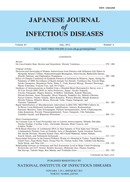
JAPANESE JOURNAL OF INFECTIOUS DISEASES
Advancing global knowledge in infectious disease science.The Japanese Journal of Infectious Diseases, published by the National Institute of Infectious Diseases in Japan, serves as a vital platform for researchers, clinicians, and public health professionals committed to advancing the field of infectious disease science. With an ISSN of 1344-6304 and an E-ISSN of 1884-2836, this journal has maintained its academic rigor since its inception in 1961 and continues to contribute significantly to the global understanding of infectious diseases. The journal holds a Q3 ranking in the categories of Infectious Diseases, Miscellaneous Medicine, and Medical Microbiology as of 2023, reflecting its important role in disseminating impactful research. With many articles available through Open Access, it ensures wide accessibility to the latest discoveries and insights. Researchers can expect to find high-quality studies that address critical challenges in the control and prevention of infectious diseases, making this journal an essential resource for anyone engaging in this critical field.

TROPICAL BIOMEDICINE
Innovating research in parasitology.Tropical Biomedicine, published by the Malaysian Society of Parasitology and Tropical Medicine, is an influential journal dedicated to the field of infectious diseases and parasitology. Since its inception in 2005, the journal has aimed to advance scientific knowledge and foster research in tropical health, providing a vital platform for disseminating high-quality research findings, case studies, and reviews. With a Q3 ranking in Infectious Diseases and a Q4 in Parasitology for 2023, the journal plays an essential role in addressing the challenges faced in these fields, particularly in tropical and subtropical regions. Although currently not open access, its contributions are pivotal for researchers, healthcare professionals, and students dedicated to combating diseases prevalent in diverse ecological environments. By focusing on relevant topics and innovative approaches, Tropical Biomedicine seeks to enlighten and inspire the ongoing fight against tropical diseases, ultimately improving public health outcomes.

PARASITOLOGY RESEARCH
Elevating understanding through rigorous research and review.PARASITOLOGY RESEARCH, published by Springer, stands as a pivotal journal in the fields of parasitology, infectious diseases, and insect science, with a rich history dating back to 1987. Operating from Germany, this journal has garnered an impressive reputation, achieving a high ranking within various categories, including Q1 in Veterinary (miscellaneous) and Q2 across several relevant fields as of 2023. While it does not currently offer Open Access options, the journal remains a vital resource for researchers, professionals, and students seeking to contribute to and keep pace with advancements in parasitological studies. With a commitment to publishing high-quality research, PARASITOLOGY RESEARCH serves as an essential forum for disseminating findings that enhance our understanding of parasitic organisms and their impacts on health and the environment. Explore this journal to engage with cutting-edge investigations and reviews that drive innovation in parasitology and related disciplines.

MEMORIAS DO INSTITUTO OSWALDO CRUZ
Empowering Scholars with Open-Access Medical Discoveries.MEMORIAS DO INSTITUTO OSWALDO CRUZ, published by the esteemed FUNDACO OSWALDO CRUZ in Brazil, serves as a vital platform for the dissemination of research in the fields of medicine and microbiology. With its inception dating back to 1909 as an open-access journal, it has made significant strides in promoting the understanding of health-related topics and infectious diseases across its diverse readership. This journal is recognized for its contribution to the scholarly community, boasting a Q2 category in Medicine (miscellaneous) and a Q3 rating in Microbiology (medical) as per the 2023 quartiles. Located in Rio de Janeiro, the journal not only embraces a rich historical context but also engages with contemporary issues in public health. Researchers and professionals in related fields will find valuable insights and data that underscore the significance of scientific collaboration in tackling global health challenges. With access to its archives spanning multiple decades, MEMORIAS DO INSTITUTO OSWALDO CRUZ remains a key resource for students and researchers alike as they endeavor to expand their knowledge and contribute to future innovations in health science.

Parasites Hosts and Diseases
Fostering Global Insights into Parasitology and Infectious DiseasesParasites Hosts and Diseases is an emerging academic journal focusing on the intricate relationships between parasites, their hosts, and associated diseases. Published by the Korean Society of Parasitology in collaboration with Seoul National University College of Medicine, this journal is a significant contribution to the fields of Infectious Diseases and Parasitology, and it has secured a place in the Q3 category for both disciplines as of 2023. With an ISSN of 2982-5164 and an E-ISSN of 2982-6799, this open-access publication aims to foster scholarly communication and provide a platform for researchers to disseminate their findings on critical issues related to parasitic infections and the pathogenesis thereof. Although it is still in the early stages of its history, the journal has already positioned itself as a useful resource within its field, with Scopus rankings showing it as 48th of 79 in Parasitology and 210th of 344 in Infectious Diseases, indicating its growing influence and the potential for impactful research. Situated in South Korea, and via its open-access model, Parasites Hosts and Diseases is committed to reaching a global audience of scientists, healthcare professionals, and students, all dedicated to understanding and combating the challenges posed by parasitic diseases.
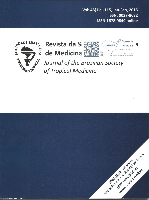
Revista da Sociedade Brasileira de Medicina Tropical
Pioneering insights in tropical and infectious diseases.Revista da Sociedade Brasileira de Medicina Tropical is a distinguished open-access journal published by the Sociedade Brasileira de Medicina Tropical, focusing on the critical fields of Infectious Diseases, Microbiology, and Parasitology. Since its inception in 1972, this journal has committed to disseminating impactful research that addresses pressing global health challenges, particularly in tropical and infectious diseases prevalent in Brazil and beyond. With a robust publication history, it has been recognized as a Q3 journal in esteemed categories, reflecting its valuable contributions to scientific literature and its ranking in various Scopus categories, including a notable position in Parasitology. Researchers, professionals, and students are encouraged to engage with its rich repository of research, which has been freely accessible since 1997, fostering a wide-reaching impact on public health strategy and scientific innovation.

ACTA TROPICA
Exploring the Dynamics of Infectious Diseases and BeyondACTA TROPICA is a prestigious academic journal published by Elsevier, dedicated to advancing knowledge in the fields of Infectious Diseases, Insect Science, Parasitology, and Veterinary sciences. With an ISSN of 0001-706X and an E-ISSN of 1873-6254, it has established itself as a vital resource since its inception in 1945. The journal is recognized for its significant impact within the scientific community, boasting a Q2 ranking in Infectious Diseases and Parasitology, and a Q1 ranking in both Insect Science and Veterinary (miscellaneous) categories as of 2023. Specifically, it ranks #19 in Scopus for Parasitology and #129 for Infectious Diseases, underscoring its high visibility and relevance in these vital research arenas. ACTA TROPICA is a non-open access journal, ensuring high-quality peer-reviewed content that complements ongoing research and professional practices among scientists, researchers, and students. Explore groundbreaking studies and contribute to the ongoing dialogue within your field by selecting ACTA TROPICA as your next publication destination.
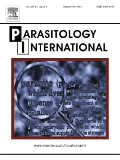
PARASITOLOGY INTERNATIONAL
Elevating Standards in Parasitology ResearchParasitology International, published by Elsevier Ireland Ltd, is a leading journal in the field of parasitology and infectious diseases. With its ISSN 1383-5769 and E-ISSN 1873-0329, this esteemed journal provides a platform for the dissemination of high-quality research covering various aspects of parasitic diseases and their treatment. Recognized for its rigorous peer-review process, Parasitology International currently holds a commendable Q2 ranking in both the Infectious Diseases and Parasitology categories for 2023. The journal's Scopus rankings further enhance its reputation, positioning it at Rank #33/79 in Parasitology and Rank #166/344 in Infectious Diseases. Covering a broad range of topics from host-parasite interactions to novel treatments, this journal plays a pivotal role in advancing knowledge and fostering innovation within the research community. Though it does not currently operate as an open access journal, it continues to attract contributions from leading experts around the world, making it an invaluable resource for researchers, professionals, and students committed to understanding and combating parasitic diseases.
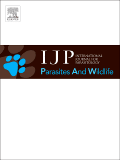
International Journal for Parasitology-Parasites and Wildlife
Innovating Solutions for Wildlife Conservation and Disease MitigationThe International Journal for Parasitology-Parasites and Wildlife, published by ELSEVIER, is a premier open-access journal dedicated to advancing the field of parasitology and wildlife research. Established in 2012, this influential journal has garnered a reputation for excellence, as evidenced by its impressive rankings, including Q1 in Animal Science and Zoology and Q2 in both Infectious Diseases and Parasitology as of 2023. With an ISSN of 2213-2244, this journal serves as a critical platform for researchers, professionals, and students, fostering a deeper understanding of parasite-host interactions and their ecological impacts. The journal encourages innovative studies that contribute to the mitigation of infectious diseases and enhance wildlife conservation efforts. With a commitment to open access, the International Journal for Parasitology-Parasites and Wildlife ensures that cutting-edge research is easily accessible to the global scientific community, helping to bridge gaps in knowledge and stimulate further inquiry.

KOREAN JOURNAL OF PARASITOLOGY
Connecting Researchers in the Fight Against ParasitesKorean Journal of Parasitology is a respected publication in the field of parasitology, originating from the esteemed Korean Society of Parasitology and affiliated with Seoul National University College of Medicine. Established in 1977, this journal focuses on disseminating significant research findings related to parasitic diseases, their vectors, and control measures, serving as a vital resource for researchers, medical professionals, and students alike. Although coverage in Scopus has been discontinued as of 2022, the journal remains a valuable platform for in-depth studies within the areas of Infectious Diseases and Immunology. With an ISSN of 0023-4001 and an E-ISSN of 1738-0006, the journal promotes open access to enhance academic sharing. Despite its current Scopus rankings, which place it in the 38th percentile for Infectious Diseases and 37th percentile for Immunology and Microbiology (Parasitology), it continues to contribute to the global discourse on parasitological research, encouraging collaboration and emphasizing the importance of this field in public health.